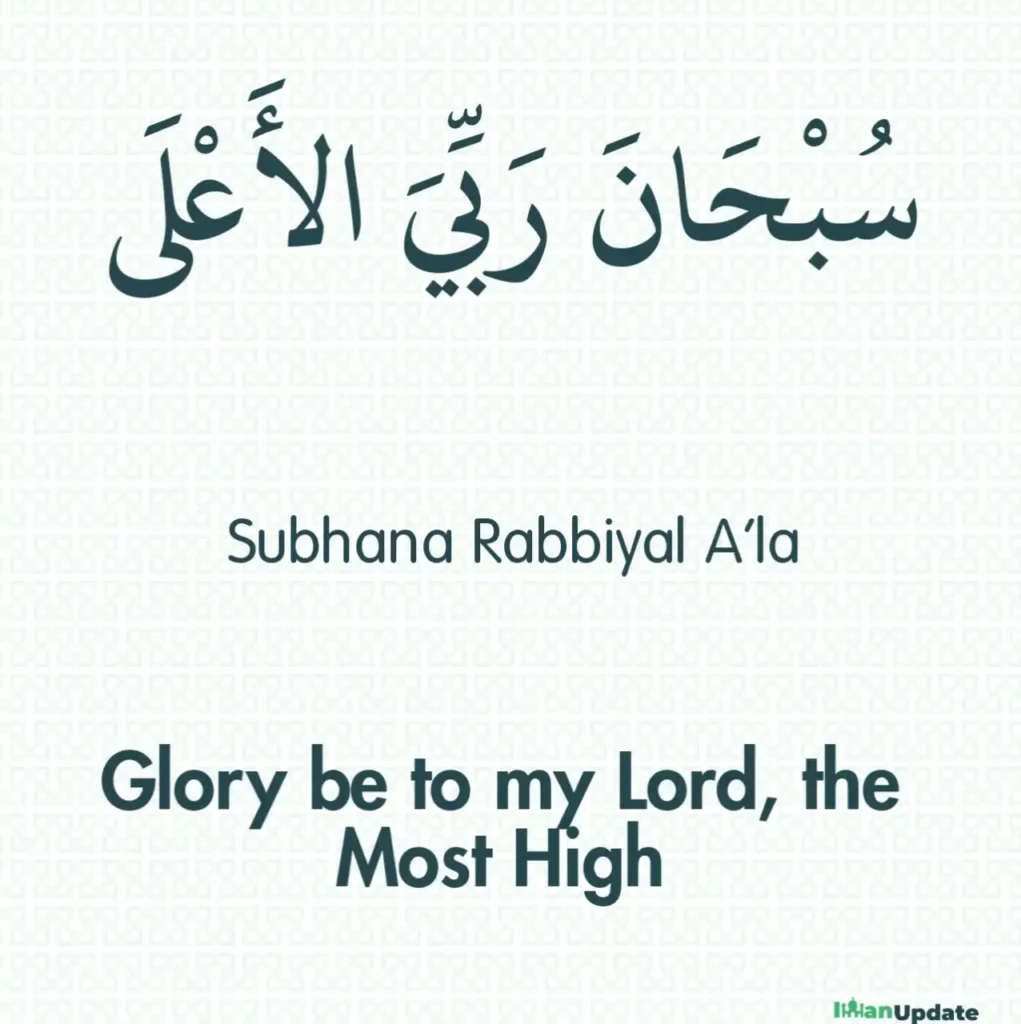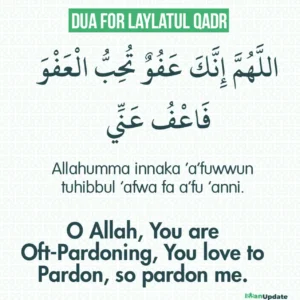Subhana Rabbiyal Ala Meaning, Hadith and Arabic Text

“Subhana Rabbiyal Ala” is a sacred dua recited during prostration (sujud). This zikr declares Allah’s freedom from all imperfections and ffirms His Supremacy and Highness.
Reciting this dua in sujud is a powerful way to connect with Allah, affirm His greatness, and cultivate a deeper sense of humility and gratitude.
Subhana Rabbiyal A’la In Arabic
Here is how to write Subhana Rabbiyal A la in Arabic text.
سُبْحَانَ رَبِّيَ الأَعْلَى
Subhana Rabbiyal Ala Meaning In English
Subhana Rabbiyal A’la means Glory be to my Lord, the Most High. It means glorifying the One Who is exalted in His Essence. The meaning of tasbeeh (glorifying Allah) is declaring Allah, may He be exalted, to be far above any shortcoming or fault.
When saying “Subhan Allah” (Glory be to Allah), you declare Allah’s transcendence above flaws and shortcomings. In bowing and prostration, focus on glorification and supplication, as reciting Qur’an is not permissible in these positions.
The Prophet (SAW) encouraged abundant supplication during prostration, as it is the closest position to Allah.
In sujud, one humbles themselves, acknowledging Allah’s loftiness and grandeur, which is beyond human comprehension.
Pondering this in prostration brings one closer to Allah, elevates their status in Jannah, and wipes out sins, as stated in the Hadith.
RELATED: Subhana Rabbiyal Azeem Meaning, Hadith and Arabic
Text of the Hadeeth
On the authority of Hudhaifah (رضي الله عنه), who said: I performed prayer with the Prophet (ﷺ) one night and he (ﷺ) opened his recitation with (the chapter entitled) al-Baqarah [The second chapter of the Qur’an].
I said (to myself): perhaps he (ﷺ) will bow in Rukoo’ after one hundred (verses); then, he continued, so I said (to myself): perhaps, he will perform the whole prayer with it (i.e. Soorah al-Baqarah). Then, he (ﷺ) continued, so I said: Perhaps he will perform one Rak’ah with it (i.e. Soorah al-Baqarah).
Then, he (ﷺ) began to recite (the chapter entitled) an-Nisa [The forth chapter of the Qur’an], so he read it (in its entirety). Then, he (ﷺ) began to recite (the chapter entitled) Ali Imran [The third chapter of the Qur’an], so he read it (in its entirety).
And he was reciting it Mutarassilan (leisurely). Whenever he came across a verse containing Tasbeeh, he would declare Allah to be free from Imperfections (i.e. saying: SubhanAllah); and whenever he came across a request, he would make that request (from Allah); and whenever he came across something to seek refuge from, he would seek refuge (with Allah) from it.
After all of this he (ﷺ) bowed in Rukoo’ and began saying: ‘Subhana Rabbiyal-Adheem’ [I declare my Rabb, the Supreme, to be free from all imperfections]. So, his bowing in Rukoo’ was similar (in length) to his standing in Qiyam.
Then, he (ﷺ) said: ‘Sami’Allahu li-man Hamidah(u)’ [Allah responds to one who praises Him]. Then, he stood for a long standing, nearly as long as his bowing in Rukoo’. Then, he (ﷺ) prostrated in Sajdah and said: ‘Subhana Rabbiyal-A’la’ [I declare my Rabb, the Most High, to be free from all imperfections]. So, his prostration in Sajdah was nearly as long as his standing in Qiyam.
[Reported by Imam Muslim in his ‘Saheeh’ (collection of Hadeeth), no. 772]
Hadith #2
It was narrated that Hudhaifah said: “I prayed with the Messenger of Allah (ﷺ), and he bowed and said when bowing: ‘Subhana Rabbial-azim (Glory be to my Lord Almighty).’ And when prostrating: ‘Subhana Rabbial-‘Ala (Glory be to my Lord Most High).’”
Source: Sunan an-Nasa’i 1046
Hadith #3
Hudhaifah narrated that: he performed Salat with the Prophet, and that while he was bowing he would say: (Subhana Rabbiyal Azim); “Glorious is my Lord the Magnificent” and while prostrating: (Subhana Rabbiyal A’la) ‘Glorious is my Lord the Most High.’
And he would not recite an Ayah mentioning mercy, except that he would stop and ask (for mercy), and he would not recite an Ayah mentioning punishment, except that he would stop and seek refuge (with Allah from it).
Source: Jami` at-Tirmidhi 262

This Hadith establishes the Islamic guideline for reciting “Subhana Rabbiyal-A’la” (I declare my Rabb, the Most High, to be free from all imperfections) during prostration (Sajdah).
Ibn ul-Qayyim explains that prostration is a position of humility, where one acknowledges Allah’s loftiness and exaltedness, declaring Him free from any imperfections.
This phrase is the most appropriate recitation in this position, as it recognizes Allah’s supremacy and majesty, while the worshiper is in a state of submission.
Although other supplications are also permissible, this specific phrase is the most excellent and encouraged recitation in prostration, as commanded by the Prophet (ﷺ). [Kitab as-Salah, by Ibn ul-Qayyim (Rahimahullah), pg. 181]






